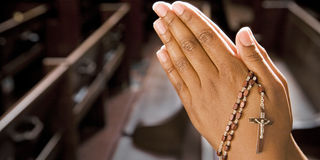Prime
Reclaiming the priestly service

What you need to know:
- Royal priesthood? Today, however, there is more of clericalism than service. Clericalism is presented as a part of the culture in which we categorise people into two or more groups: an elite group and one that is less so. Msgr John Wynand Katende examines the what clericalism does to the people in authority.
“You know how those who exercise authority among the Gentiles lord it over them; their great ones make their importance felt. It cannot be like that with you. Anyone among you who aspires to greatness must serve the rest, and whoever wants to rank first among you must serve the needs of all. Such is the case with the Son of Man who has come not be served by others but to serve, to give his life as ransom for the many” (Matthew 20:25-28).
The Holy Orders
July and August are the traditional season for ordinations to the priesthood, in the Catholic Church in Uganda. Candidates receive the Sacrament of Holy Orders in culmination of several years of rigorous study and spiritual development at the seminary.
In Roman Catholic theology, the action of “Laying on of Hands” and the “Prayer of Consecration” by a bishop, are the heart of the Ordination Rite and confer the grace of ministerial priesthood.
A proper understanding of the character of orders grounds the priests in a fruitful life of ministry and service, in the manner Christ has called them.
The royal priesthood
Today, however, there is more of clericalism than service. Clericalism is presented as a part of the culture in which we categorise people into two or more groups: an elite group and one that is less so. It contradicts the teaching on the royal priesthood conferred upon all baptised (1 Peter 2:9). Clericalism is found also in other fields of endeavor including medicine, law, and the military.
Clericalism poses contradictions to service to the gospel and to the mission of the Church, to which priests are called. It leads to abuses of power, that ordained ministers are better than and should be over everyone else among the People of God.
Their word and behaviour are not to be questioned. The laity also indirectly encourage clericalism by referring to parish priests as “boss” (Bwanamukulu).
If clericalism gives the priest and bishop greater control, it also gives them greater responsibility. Having unquestioned “authority” to speak on so many matters also means that priests are expected to have answers beyond their competence. Clericalism distorts the human relationships between laity and the clergy, and corrupts the body of Christ. Worst of all, it is not faithful to the vision of servant leadership, to which Christ calls on us all.
Leave no one behind
Pope Francis has made clericalism a major target of the reforms in the Church. He is looking for the restoration of a genuine priesthood, with a synodal understanding of the Church, in mind.
Where the laity have been ignored or simply suppressed by those with harmful clericalist attitudes, listening implies incorporating the laity’s experiences into decision-making and and ensuring no one is excluded from the life of the Church.
What ought to be blended
Preparations are underway for a synod on synodality in 2023. Synodality indicates a change in the Church’s way of acting and making decisions. It ill be an implementation of the Second Vatican Council’s call for communion and participation of all in the mission of the Church, in the 21st century.
It will require blending both the theological and sociological dimensions of the Church’s teaching. It will highlight the unique role of the gifts that the Spirit has poured out upon the people of God for the benefit of the Church (1 Corinthians 12:4-5). Synodality works in conjunction with the Church’s hierarchical structure and authority. It leads to a greater sense of co-responsibility in the Church for both clergy and laity.
“The Church should have priests after the heart of Christ. It requires constant conversion of heart and true Christian maturity and freedom. Maturity requires that I be sufficiently secure in my identity as to be able to be absorbed in the good of those I will serve.” observes Father David Toups (Reclaiming Our Priestly Character)





